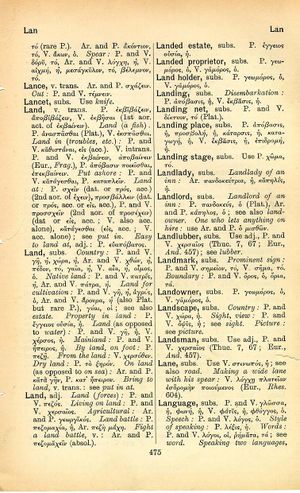land: Difference between revisions
ἤτοι ἐμοὶ τρεῖς μὲν πολὺ φίλταταί εἰσι πόληες Ἄργός τε Σπάρτη τε καὶ εὐρυάγυια Μυκήνη → The three cities I love best are Argos, Sparta, and Mycenae of the broad streets
(CSV4) |
m (Text replacement - "<b class="b2">Frag.</b>" to "''Frag.''") |
||
| Line 4: | Line 4: | ||
<b class="b2">Land</b> (<b class="b2">a fish</b>). P. ἀνασπᾶσθαι (Plat.), V. ἐκσπᾶσθαι. | <b class="b2">Land</b> (<b class="b2">a fish</b>). P. ἀνασπᾶσθαι (Plat.), V. ἐκσπᾶσθαι. | ||
<b class="b2">Land in</b> (<b class="b2">troubles, etc.</b>): P. and V. καθιστάναι, εἰς (acc.). | <b class="b2">Land in</b> (<b class="b2">troubles, etc.</b>): P. and V. καθιστάναι, εἰς (acc.). | ||
V. intrans. P. and V. ἐκβαίνειν, ἀποβαίνειν (Eur., | V. intrans. P. and V. ἐκβαίνειν, ἀποβαίνειν (Eur., ''Frag.''), P. ἀπόβασιν ποιεῖσθαι. ἐπεκβαίνειν. | ||
<b class="b2">Put ashore</b>: P. and V. κατάγεσθαι, P. καταπλεῖν. | <b class="b2">Put ashore</b>: P. and V. κατάγεσθαι, P. καταπλεῖν. | ||
<b class="b2">Land at</b>: P. σχεῖν (dat. or [[πρός]], acc.) (2nd aor. of ἔχειν), προσβάλλειν (dat. or [[πρός]], acc. or εἰς, acc.), P. and V. προσσχεῖν (2nd aor. of προσέχειν) (dat. or εἰς, acc.; V. also acc. alone), κατάγεσθαι (εἰς, acc.; V. acc. alone); see [[put in]]. | <b class="b2">Land at</b>: P. σχεῖν (dat. or [[πρός]], acc.) (2nd aor. of ἔχειν), προσβάλλειν (dat. or [[πρός]], acc. or εἰς, acc.), P. and V. προσσχεῖν (2nd aor. of προσέχειν) (dat. or εἰς, acc.; V. also acc. alone), κατάγεσθαι (εἰς, acc.; V. acc. alone); see [[put in]]. | ||
Revision as of 11:01, 7 August 2017
English > Greek (Woodhouse)
v. trans.
P. ἐκβιβάζειν, ἀποβιβάζειν, V. ἐκβῆσαι (1st aor. act. of ἐκβαίνειν). Land (a fish). P. ἀνασπᾶσθαι (Plat.), V. ἐκσπᾶσθαι. Land in (troubles, etc.): P. and V. καθιστάναι, εἰς (acc.). V. intrans. P. and V. ἐκβαίνειν, ἀποβαίνειν (Eur., Frag.), P. ἀπόβασιν ποιεῖσθαι. ἐπεκβαίνειν. Put ashore: P. and V. κατάγεσθαι, P. καταπλεῖν. Land at: P. σχεῖν (dat. or πρός, acc.) (2nd aor. of ἔχειν), προσβάλλειν (dat. or πρός, acc. or εἰς, acc.), P. and V. προσσχεῖν (2nd aor. of προσέχειν) (dat. or εἰς, acc.; V. also acc. alone), κατάγεσθαι (εἰς, acc.; V. acc. alone); see put in. Easy to land at, adj.: P. εὐαπόβατος. subs. Country: P. and V. γῆ, ἡ, χώρα, ἡ, Ar. and V. χθών, ἡ, πέδον, τό, γαῖα, ἡ, V. αἶα, ἡ, οἶμος, ὁ. Native land: P. and V. πατρίς, ἡ, Ar. and V. πάτρα, ἡ. Land for cultivation: P. and V. γῆ, ἡ, ἀγρός, ὁ, Ar. and V. ἄρουρα, ἡ (also Plat. but rare P.), γύαι, οἱ; see also estate. Properly in land: P. ἔγγειος οὐσία, ἡ. Land (as opposed to water): P. and V. γῆ, ἡ, V. χέρσος, ἡ. Mainland: P. and V. ἤπειρος, ἡ. By land, on foot: P. πεζῇ. From the land: V. χερσόθεν. Dry land: P. τὸ ξηρόν. On land (as opposed to on sea): Ar. and P. κατὰ γῆν, P. κατʼ ἤπειρον. Bring to land, v. trans.: see put in at. adj. Land (forces.): P. and V. πεζός. Living on land: P. and V. χερσαῖος. Agricultural: Ar. and P. γεωργικός. Land battle: P. πεζομαχία, ἡ. Ar. πεζὴ μάχη. Fight a land battle, v.: Ar. and P. πεζομαχεῖν (absol.).

